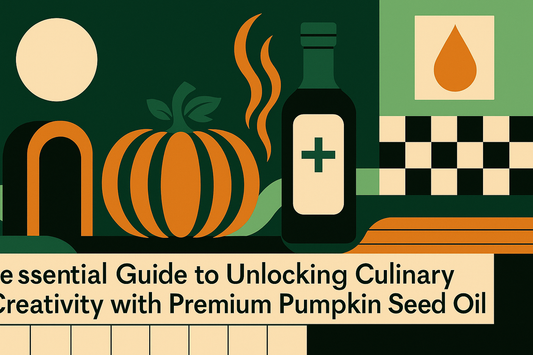
Choosing the Right Oil: Pumpkin Seed Oil vs. Extra Virgin Olive Oil
Introduction
In the realm of culinary creativity and wellness exploration, choosing between pumpkin seed oil and extra virgin olive oil presents an engaging debate. Each oil brings its own unique character and nutritional profile, offering ingredients that work wonderfully in different kitchens and routines. For those interested in an oil comparison that touches on both flavor and function, understanding the nuances of each is an essential step toward choosing oil for wellness and cuisine.
Background on Pumpkin Seed Oil
Origin and Production Methods
Pumpkin seed oil has a rich heritage marked by its connection to fertile agricultural lands. Produced using modern extraction methods, this oil captures a distinct nutty flavor and aroma without relying on the conventional cold-press technique. Brands like Belvoro Pumpkin Seed Oil highlight a unique Slovenian Styrian origin, ensuring that every drop is backed by advanced processing techniques aimed at preserving its signature profile.
Nutritional Profile
The oil is celebrated for offering a mix of micronutrients, antioxidants, and essential fatty acids. When examining the nutritional differences pumpkin seed oil extra virgin olive oil, enthusiasts often note that pumpkin seed oil provides a unique blend that contributes to a well-rounded diet. Such characteristics play an important role in discussions around pumpkin seed oil vs extra virgin olive oil benefits.
Culinary Uses
In the kitchen, pumpkin seed oil proves to be an excellent enhancer, especially when drizzled over salads or used as a finishing touch on roasted vegetables. Its bold, nutty flavor lends an exciting twist to traditional recipes, making it a favored ingredient among those seeking to creatively elevate everyday dishes.
Background on Extra Virgin Olive Oil
Traditional Production Methods
Extra virgin olive oil is renowned for its method of production that has been refined over centuries. The process carefully extracts the oil from olives in a manner that preserves its rich character and delicate balance. This method is part of what gives extra virgin olive oil its enduring appeal in kitchens around the world.
Health and Nutritional Benefits
Known for its abundance of healthy fats and natural antioxidants, extra virgin olive oil has long been celebrated in culinary circles. Its storied reputation stems not only from its flavor but also from its historical role in supporting a balanced approach to eating.
Culinary Applications
Extra virgin olive oil is a staple in many recipes, from sautéing and dressing to finishing dishes with a refined touch. It is favored for its smooth texture and harmonious flavor, making it especially suitable for recipes that benefit from its classic profile.
Comparative Analysis
Nutritional Comparison
When assessing pumpkin seed oil vs extra virgin olive oil benefits, one can observe notable contrasts in their nutritional offerings. Pumpkin seed oil distinguishes itself with a rich array of micronutrients and bioactive compounds, while extra virgin olive oil is appreciated for its well-established balance of healthy fats and antioxidants. The subtle nutritional differences pumpkin seed oil extra virgin olive oil provide can help guide those looking to optimize their diet with natural ingredients.
Flavor Profiles and Aroma
Taste is often the deciding factor in any oil comparison. Pumpkin seed oil impresses with its robust, nutty taste and distinct aroma, making it an exciting addition for drizzling over cold dishes or salads. In contrast, extra virgin olive oil carries a smooth, rounded flavor that many associate with time-honored recipes and a deep culinary tradition. Ultimately, the choice often comes down to personal preference.
Culinary Applications
Both oils carve out a unique space in the kitchen. Pumpkin seed oil is especially well-suited for recipes that benefit from an intense flavor punch, while extra virgin olive oil frequently plays a central role in recipes that call for a more subtle, refined taste. Their individual attributes ensure that each oil can enhance specific dishes in distinctive ways.
Production and Sustainability
The methods used to produce these oils also contribute to their character. The advanced extraction technique applied to pumpkin seed oil reflects innovative and sustainable practices, while extra virgin olive oil benefits from established processing practices that have been refined over generations. These production choices not only influence flavor but also highlight the varying commitment to environmental stewardship in each industry.
Use Cases and Recommendations
When to Choose Pumpkin Seed Oil
Pumpkin seed oil, as exemplified by selections such as Belvoro Pumpkin Seed Oil, is an excellent option when a recipe calls for a rich, bold flavor with a nutrient-dense profile. It can enhance dishes ranging from fresh greens to warm, roasted ingredients, making it a perfect fit for those looking to experiment with robust tastes.
When to Opt for Extra Virgin Olive Oil
Extra virgin olive oil remains a go-to ingredient for recipes that benefit from a subtle yet distinctive flavor. Its longstanding role in a variety of culinary traditions makes it ideal for cooking methods that require a delicate balance of taste, especially in recipes that honor the heritage of classic ingredients.
Tips for Incorporating Both Oils
Integrating both pumpkin seed oil and extra virgin olive oil into your cooking routine can lead to truly delightful results. Try using pumpkin seed oil to finish salads or cold dishes where its flavor can shine, and rely on extra virgin olive oil in recipes that involve moderate heat or require a well-rounded taste. This thoughtful pairing offers a way to enjoy the best properties of each oil while crafting meals that are both nutritious and delicious.
Conclusion
The decision between pumpkin seed oil and extra virgin olive oil ultimately depends on individual taste, culinary style, and lifestyle preferences. Each oil has distinct qualities that cater to different needs, whether you prioritize a bold flavor profile or a classic taste with a long-standing legacy. As you continue to explore the rich world of natural oils, consider experimenting with both options to discover which best aligns with your personal goals in the kitchen and beyond.
Frequently Asked Questions
Q: What distinguishes the nutritional profile of pumpkin seed oil from extra virgin olive oil?
A: Pumpkin seed oil offers a unique mix of micronutrients and bioactive compounds, whereas extra virgin olive oil is known for its healthy fats and well-established antioxidant properties.
Q: Can I use both oils interchangeably in recipes?
A: Each oil has distinct attributes that shine best in their chosen applications, so using them according to the needs of specific recipes can yield optimal flavor outcomes.
Q: How do production methods influence the flavor of each oil?
A: The advanced extraction process for pumpkin seed oil results in a unique flavor and aroma, while the traditional techniques used for extra virgin olive oil preserve a classic taste profile.



